CAPE OF STORMS
Why more than two months worth of rain fell in Western Cape weekend storm
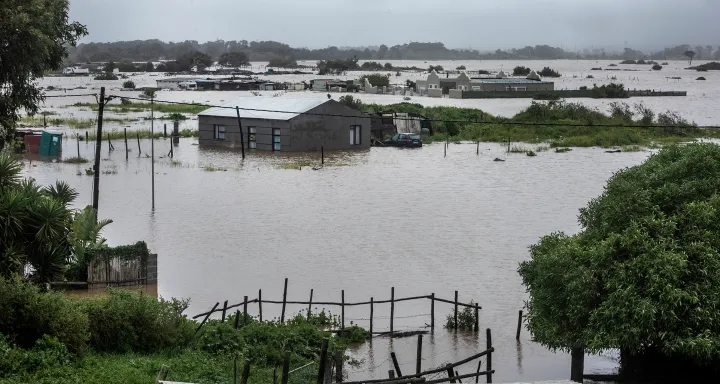
As parts of the Western Cape grapple with the aftermath of a destructive weather system that tore off rooftops and submerged roads, Daily Maverick spoke to experts who explained what happened and why it may happen again.
Over the weekend in the Western Cape, nature’s fury was unleashed with seemingly unprecedented intensity, with rooftops ripped off, roads submerged and communities cut off from the outside world. In what is almost certainly the wettest year in the province’s recent history, the Heritage Day weekend saw more rain in three days than in the previous two months.
But what exactly caused all of this and how normal or abnormal is it?
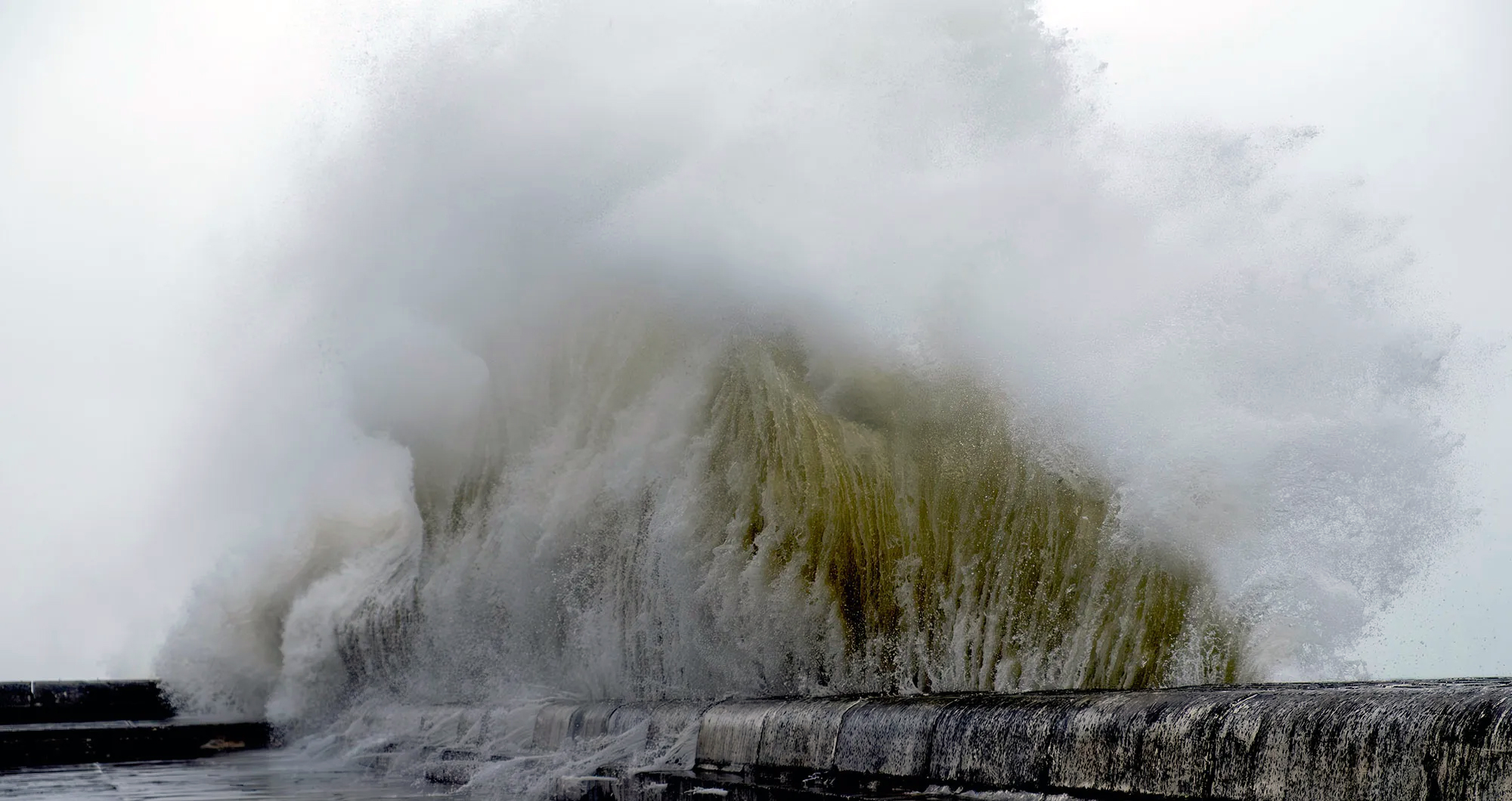
In the Kalk Bay area, a spectacle unfolded as huge waves pounded the harbour. As these surged skyward, bystanders erupted in panic, with successive ‘watch outs!’ echoing through the salty sea spray. (Photo: Kyra Wilkinson)
In conversations with Daily Maverick, Dr Peter Johnston, a climate scientist and research officer at the University of Cape Town’s Climate System Analysis Group (CSAG) and Kate Turner, a forecaster at the South African Weather Service (Saws) explained why the Western Cape was rocked by wet and windy weather.
Read more in Daily Maverick: Downpours and gales wreak havoc across Western Cape over the heritage weekend
A ‘cut-off-low’
The Saws, after issuing an Orange Level 9 warning, explained that from Saturday night, a “cut-off low-pressure system” — the equatorward displacement of a low-pressure system at high altitudes — developed along the west coast of South Africa. That system intensified by Sunday as it entered the country’s western interior, causing bursts of intense rainfall, flash flooding, strong winds and very rough seas.
A cut-off low is a “type of weather system that develops in the upper air causing showers and thundershowers”, Turner explained.
“These kinds of lows can be very severe. They can range from almost not affecting anything to … very severe; they’re one of the most intense systems that we could potentially get over the country. So this is not uncommon for us. But yes, this was definitely a very intense system that moved over, over the last couple of days.”
Johnston expanded on this definition.
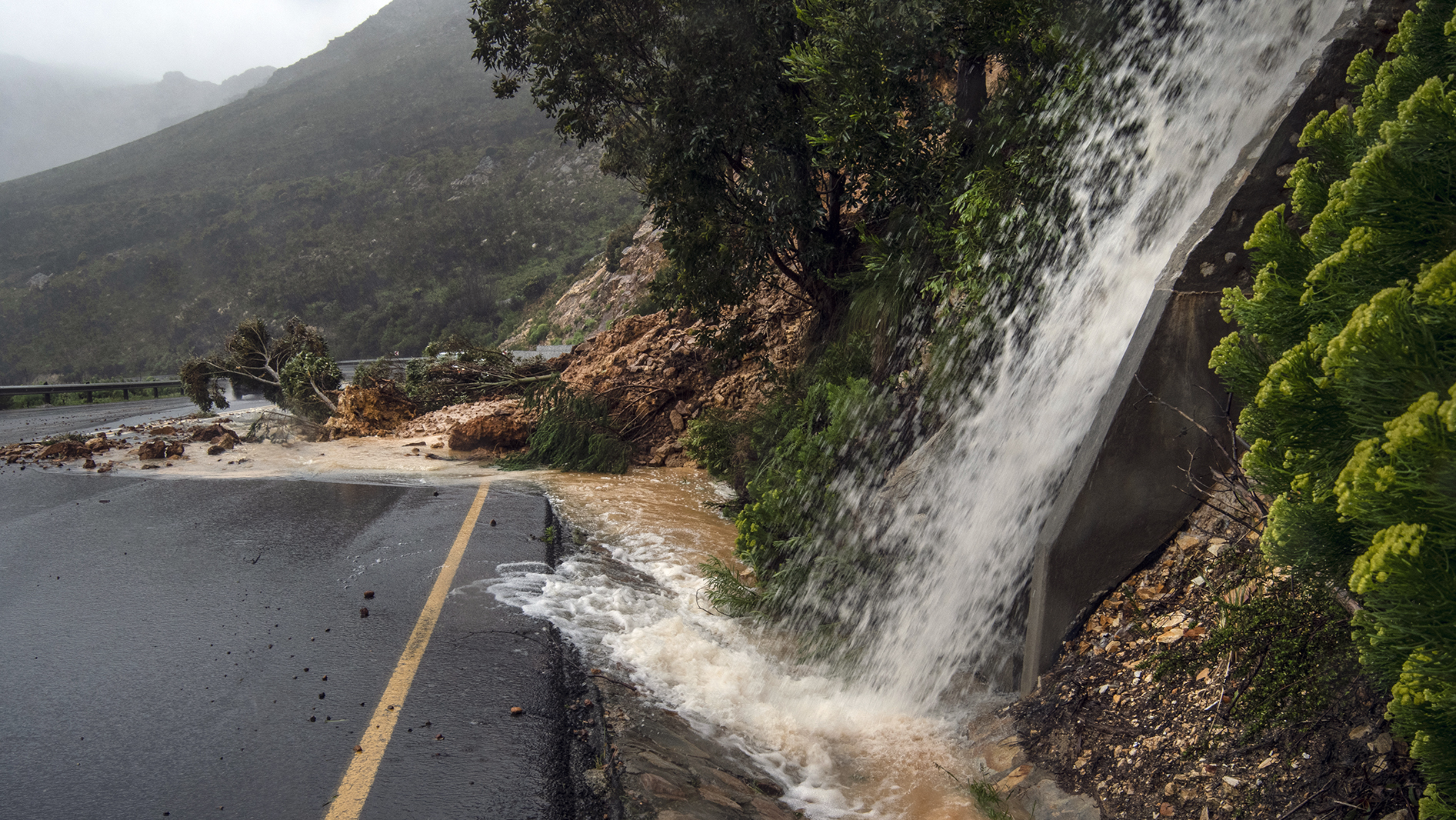
Sir Lowry’s Pass above Somerset West was closed for hours due to fallen trees on 25 September 2023. Disaster management officials have been working round the clock amid reports of flooded roads, damaged homes, uprooted trees and power outages. (Photo: Benton Geach / Gallo Images
A cut-off low is “a depression, which means it’s a low-pressure system with rising air being drawn up into the upper atmosphere and it can be very intense in that this rising air can carry a lot of moisture coming off the ocean. It carries a lot of moisture, forms a lot of clouds.
“It’s like a frontal system, but this is being cut off from what we call the flow towards the east of the frontal system. Normally, frontal systems will pass us and then they’ll move quite quickly towards the east. And this little system is cut off from that flow and so it stays semi-stationary. So it hangs around and it’s very unpredictable. It doesn’t move as quickly as a frontal system and therefore if it decides to start raining in a place, it can keep raining there for two or three days,” he explained.
“It’s very strong. It’s very powerful,” but, “it’s not a hurricane. It’s not a tornado,” Johnson was careful to stress.
Put simply, this atmospheric orphan, detached from the flow, when parked in one generalised location can lead to prolonged and intense rainfall. It was this obstinate system that brought about the downpour, resulting in meteorological mayhem over the Western Cape this weekend.
‘It’s been phenomenal’
But just how intense was this weekend’s weather, according to the science and historical precedent? Johnston had the answers.
“When we use models and projections, we have projections of what’s going on in the upper air … about three to five kilometres up in the sky, and we measure what’s going on there and if the pressure up there is very low, then we know that the system is very deep.
“So this system is extending quite high in the sky and the air is therefore moving upward, and as it’s moving upwards, it’s drawing more air with it and more moisture and therefore we can determine how strong it is and how much rain there’s likely to be.
“So it’s really the strength of the system which is measured by the height at which it’s being shown on the charts and this height of the system will indicate how much condensation is going to take place and therefore how much rain the system can hold,” he continued.
“If a system is isolated to just the upper atmosphere, we probably won’t have any rain and if it’s isolated to just the lower part of the atmosphere, then we get very little rain and it passes very quickly.
“But when it connects from the lower to the upper atmosphere and is very deep — that is, the atmospheric depth of the system that we use to measure — and if that’s very high, then we will see very, very high rainfall and that’s exactly what we’ve had.
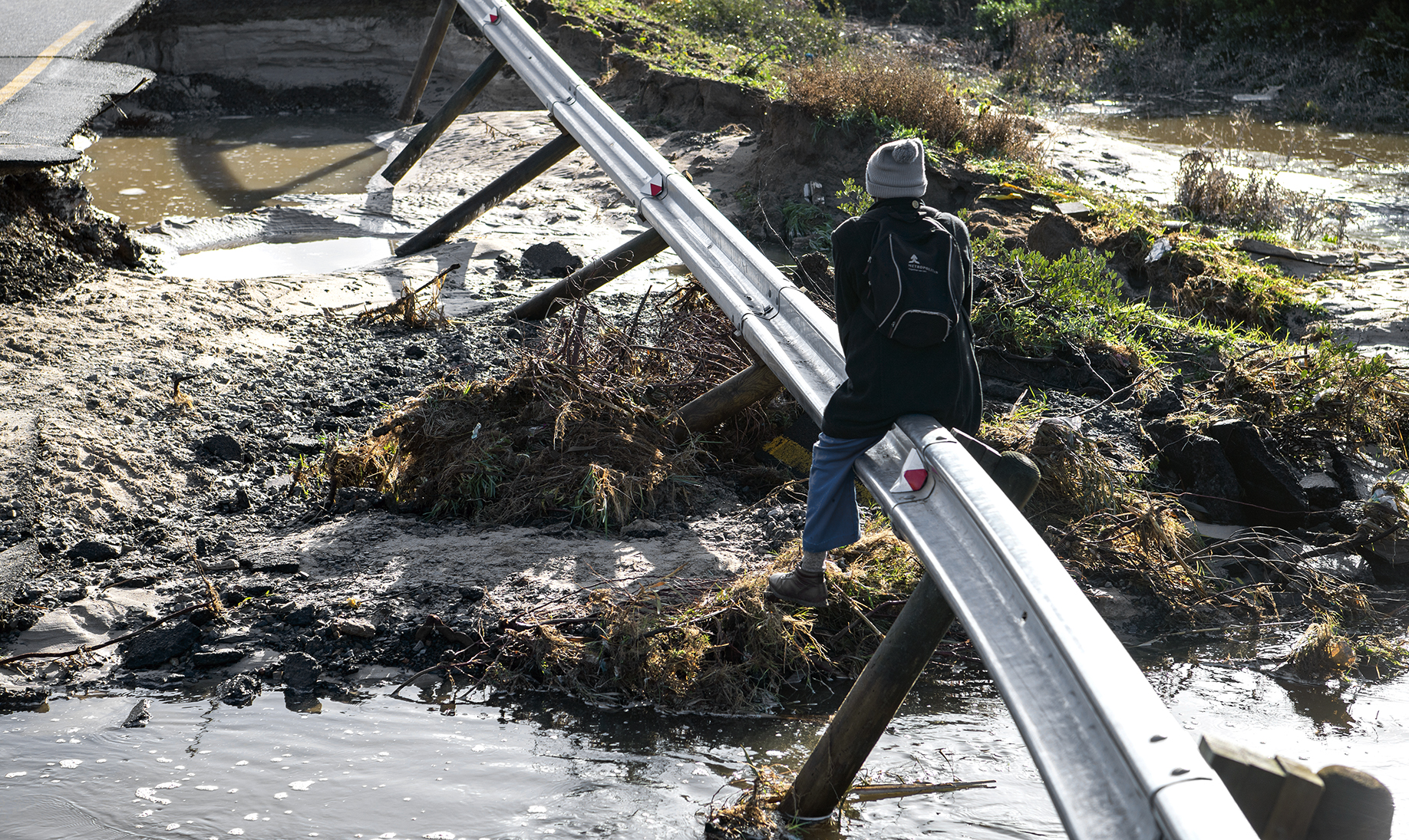
A pedestrian tries to cross Spine Road in Cape Town after a section of the road surface between the N2 and Mfuleni was washed away on 15 June 2022 after a cold front moved over the Western Cape. (Photo: Gallo Images / Die Burger / Jaco Marais)
“We’ve had more rainfall over the last three days than we have in two winter months, so it’s been phenomenal.”
Turner from the weather service confirmed this, saying that in just two days the Cape Winelands and Stellenbosch received more than 193mm of rain. The City of Cape Town had 143mm of rainfall over the same period.
Turner added that while the intensity may vary, “These kinds of flows generally occur during our changeover seasons. They’re not confined to our changeover seasons, but it is during the spring and autumn that these are most often occurring.
“We’ve had a number of drier seasons for the last couple of years, where we are increasing in terms of amounts of rainfall through the winter and into the springtime, but definitely this year has been the wettest season in the last 10 years.
“So it’s not uncommon,” she clarified. “But it hasn’t been as intense as what we’ve experienced over the weekend and in a fair number of years.”
Daily Maverick reported in June that Dr Piotr Wolski, the chief research officer for hydroclimatology at CSAG, said, “If we look at total rainfall between January and now … at some locations, this year’s values are the highest on the recent record (we are looking at 20-40 years of data here)”.
Read more in Daily Maverick: Western Cape: Rainfall this year is breaking records in SA’s ‘most disaster-prone’ province
It was not only the rains that caused havoc. Wild, whipping winds wrought wreckage, from the Winelands to Wynberg.
Johnston explained that according to measurements taken with his personal at-home weather station, wind gusts reached up to 68km/h.
“Those sort of gusts are very damaging and that’s what blew the trees down and roofs and things off,” he added.
‘Most disaster-prone province’
While scientists like Johnston can shed light on the mechanics of such events, attributing specific weather events to climate change remains a complex task.
Daily Maverick has reported that Western Cape local government, environmental affairs and development planning MEC, Anton Bredell, said the province is characterised by a highly variable weather and climate system. This means it has always, and will in future, experience all manner of extreme weather and climatic events including flooding, drought and extreme temperature.
“The Western Cape is the most disaster-prone province in South Africa, and is particularly vulnerable to climate change and the effects of climate-related hazards because of its coastal location, with rising sea temperatures expected to influence regional weather patterns,” said Bredell at the time.
Studies have found that at least 334 major flood events occurred in the Western Cape between 1900 and 2018, with roughly three events occurring in any given year. However, this varies — in 2008, the province experienced 20 floods, and 15 in 1981, he noted.
He said that statistically it appeared that in recent years there had been a trend towards more flood events.
Climate change makes extreme rain more likely
Flooding has also been identified in the Western Cape Climate Change Response Strategy: Vision 2050 and its Implementation Plan as one of the many areas of concern.
The Western Cape government expects that the natural variability in the weather patterns of the Western Cape is likely to intensify because of climate change, causing flooding and droughts.
Read more in Daily Maverick: The city that blows hot and cold – Cape Town’s flood-drought dichotomy explained
Speaking about the role of human-induced climate change in this weekend’s weather, Johnston explained that while there was no established causal relationship at present, as Earth’s temperature continued to rise due to the accumulation of greenhouse gases, we would see more intense and unpredictable weather patterns.
Rising sea surface temperatures and increased atmospheric moisture content contribute to the formation of cut-off low-pressure systems, like the one which caused so much destruction in the Western Cape this weekend.
“Because of global warming, the climate system is more active and that’s the reason why we’re seeing more intense rainfall events all around the globe. The rain seems to be more intense because the Earth is warmer, there’s more water evaporating into the atmosphere and there’s more water available then for rain to occur,” he explained.
“So this is the main issue and climate change may not be directly responsible for what happened this weekend, but it is making conditions suitable for heavy rainfall more likely. So there’s always a higher likelihood of extreme rainfall as the temperature increases and this is what we’re seeing. We know that the temperature is increasing. We see it every decade, there’s no doubt about it whatsoever.” DM








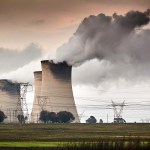












Let us book Dr Peter Johnston and Kate Turner NOW to explain to us AFTERWARDS in 30 years time why it is clear that mankind cannot cause Global Warming!
Average temp of Planet Earth. – 15ºC
Population of Earth – 9 Billion
Population temp – 37ºC
The People are heating the Earth!!
the only thing that is clear is that you have no clue mj
Did you read the article and what Dr Johnston said?
Firstly, great that the authors don’t simply use the hackneyed phrase “climate change”. Climate(s) change the whole time (see my article : SA’s Changing Climate” in DM dated 4 June 2023). Global warming (we are currently in a warming phase) is just one facet of climate change. Humans are not the only contributors, but I don’t think the authors imply that. From a scientific perspective, the article is accurate, informative, and well written.
Yes, we need more carbon dioxide to produce more plant food and meat.
Cool, you can pick up some cheap houses and farms in the smokestack shadow of Eskom and Sasol.
Imagine your veggie garden with all that lovely CO2!
IF the sea temperature is rising,
it is only because the temperature of earth’s core is rising.
It is impossible for the sun to heat the ocean,
as sun rays can only penetrate (and radiate!?)
one (1) kilometer deep into the ocean.
And heat travels UP, not down.
The earth’s core temperature fluctuates with 100 degrees Celsius,
over thousands of years.
Man-made-global-warming-science is a hoax.
And your preacher told you all this?
Steve, don’t jump to religion if you don’t understand something.
Well, we’ve already ascertained that you aren’t an oil and gas troll, so that only leaves religion, because the nonsense you’re spouting doesn’t have a scientific background IMHO, unless you can prove yourself, which I doubt you can.
Steve, it is just common sense.
I ask myself daily: Does this make sense?
I argue both ways with myself (silently!),
and base my opinions on what makes sense.
Hands over face emoji.
dear Lord save us from this level of nonsense! who in their right mind even approve this type of comment? the ocean’s deepest point is only 9km whereas the diameter of earth 12 742km. that fact alone should make you pause and consider the insulation offered by literally thousands of kms of earth. The flux of heat through the surface of the solid earth is less than 0.2 W/m2 whereas the sun heats the surface of the earth at a rate of around 300 W/m2 (that is a factor of 1500!)). Hence the sun’s heat, via heat trapped by the increase in CO2 in the atmosphere, is by far the single biggest contributor to climate change.
Indeed!
Wilem Boshof
Start digging a hole,
and within 10km the heat become unbearable.
Even at that shallow depth,
rocks become plastic-like.
Actually, no. Heat transfer results in convection which will carry the heat from the surface to the cooler lower levels (else the bottom of the ocean would be ice). Its basic thermodymics which everyone should know. Effectively top layers become more energetic due to heat which causes a “draw” if you like which transfers the heat to the lower colder layers – this results in the currents we all know and love, and of course distributes the heat vertically. Obviously the depths will never be as warm as the surface. The sun most definitely DOES heat the ocean, not the core of the planet. How did you come to that misconception, by the way? I am genuinely curious. BTW – something to consider: as the surface heats, the difference becomes sharper. Guess what that leads to? Faster currents, worse weather etc, etc, etc.
Clay Maartens,
Heat travels up,
the sun cannot heat the oceans.
The surface ARE heated,
from the heat of the core,
and yes,
it does lead to faster currents, worse weather etc.
IF the sea temperature is rising,
it is only because the temperature of earth’s core is rising.
It is impossible for the sun to heat the ocean,
as sun rays can only penetrate (and radiate!?)
one (1) kilometer deep into the ocean.
And heat travels UP, not down.
The earth’s core temperature fluctuates with 100 degrees Celsius,
over thousands of years.
Man-made-global-warming-science is not true.
Tell us you don’t understand climate science without telling us. I recommend further reading MJ.
A few questions: 1. If sea temperatures are rising due to fluctuations in the temperature of the Earth’s core, then what is causing atmospheric temperature to rise? 2. What do feel the impact of pollution of the air and water by fossil fuel emissions is – I’m referring for example to dirty air that causes thousands of deaths per year. And plastic (derived from fossil fuels) pollution clogging our waterways because it cannot be properly disposed of? And what is your view of the role of biodiversity loss as a result of intensive agriculture (also driven by fossil fuels currently)?
1. Heat travels up.
2. Yes, pollution of the air and water by fossil fuel emissions is causing deaths, but not global warming.
Yes, we need to be more responsible in using the reserves of the planet,
but same goes for guns, cars, wars etc etc,
as ALL activities can cause death.
3. Plastic should be controlled,
60 years ago plastic was the new saviour,
turned out to be not so great,
but that is how we learn,
that is why we are here,
and we can learn better without fighting, btw
4. Biodiversity loss ?
Evolution will take care of that,
how did you think we got here?
The fact free conspiracy spreading trolls on DM are getting an airing despite the comment moderation process. Makes you wonder…
Tim, don’t kill the messenger!
But tell me, why and how do not think MODERATION of comments will allow your view point only?
Not my point of view only, but rather views that are based on science and reason, not opinions based on misinformation and falsehoods. Like yours, that the earths core is causing global temperatures to rise, which is laughable fake news.
Tim, don’t kill the messenger! But tell me, why and how do not think moderation of comments will allow your view point only?
Might not be relevant here, but we know nefarious geoengineering has been going on for years in the Cape. Man-made-warming is indeed a hoax, & for real science, by an unbought specialist, there’s nothing better than this. Dr. Patrick Moore– Carbon and Climate Catastrophe, on YouTube
1h 20m but you will know all the truth.
climate change isn’t going to cause the extinction of mankind. and it doesn’t mean the end of life on earth either. it doesn’t mean all the land is going to vanish beneath the oceans, or that going outside will be a lottery of tornade or hurricane or lightning mayhem.
but it WILL affect fixed infrastructure in a very real way. and rainfall patterns, which will afffect farming in a very real way. and while the effects of climate change are manageable, it is VERY expensive to do so. pivoting to a lower-rainfall agriculture mix is difficult and takes time and expertise. managing even a small rise in ocean levels requires significant infrastructure in coastal areas. an increase in frequency of floods costs money. drought is expensive to deal with.
climate change extremeist groups don’t speak for everyone, and especially not for rational, science-based experts who overwhelmingly agree that there will be an increase in the intensity and volitality of weather events. climate is defined in terms of decades, not years, and the long-term trends supporting a warming in the earth’d atmoshpere are starting to be more and more evident.
personally, i find it easier to believe an overwhelming majority of researchers and other experts in a field than to believe a much smaller group of individuals proclaiming a contrasting view.
also, pumpnig less polution into the atmospere is a good thing, climate change or no.
Very well said!
Yes, Jason but overpopulation is going to cause the extinction of mankind, within a relatively short time-span. Get the data and do the mathematics…
Nature regulates the populations of animals very effectively if not tampered with by mankind. But “know it all” mankind thinks otherwise: “Go Forth and multiply” is a view held by a large, ignorant majority and that will exist until the inevitanle, extinction process begins. Everyone will then be very sorry that they ignored the plight of nature.
There are far to many people right now! They are breeding out of control. The demand for earth’s resources are far exceeding the supply. This can be attributed to lack of education in the life-sciences and and the knowlege of the forecasted dire consequences of over-population, which is creeping ever closer – lack of resources, lack of food, lack of potable water lack of space lack of every thing which make life possible. Observe India, Africa, Asia where there is a lack of control with regard to over-breeding by mankind…
Our planet cannot sustain one greedy species, breeding out of control, something has to break – THE EXTINCTION OF MANKIND…
The world will carry on, maybe on a different direction – all the poorer for losing so many species in the process. That is the nature of life on earth – observe the extinction of the dinosaurs. Read all about it…
gordon, do you really think evolution will allow total extinction of mankind? 🙂
Jason du Toit
One should make one’s decision on what makes sense,
not on what the majority believes.
YouTube is not exactly an academically accredited source, if this is where you’re getting your information from, I can see why your arguments are misguided if not patently false.
Ai Lana,
I get it from common sense
Hmm, or rather a lack thereof. Delusion at its best.
Are you sure I am lacking common sense?
What about the people and their followers who build
nu-clear-power-plants next to the shore,
knowing about rising ocean levels?
ALLRITE JACK, thank you very much for this reference.
I am not a Youtube-fan,
and although I always knew that there are people who
know about the man-made-warming-hoax,
it never crossed my mind to search Youtube for that.
At least this proves that COMMON SENSE still rules!
Once again, my faith in the silent majority is growing stronger.
“While scientists like Johnston can shed light on the mechanics of such events, attributing specific weather events to climate change remains a complex task.”
I don’t begin to understand how global weather systems work and I suspect the majority of lay people who reflexively credit this sort of thing to human induced climate change don’t either.
I’ve seen a number of doomsday predictions that gained significant traction in my lifetime that failed to materialize. My gut, which is often wrong to be fair, tells me that at least some of the causes of climate change and the effects attributed to it aren’t determined by people with genuine expertise in what must be an enormously complex system with a vast number of interdependent variables.
The current iteration of the climate movement has a very strong belief based character to it and as such I’m inclined to caution when engaging with it in the same way as I would with any other kind of religious fundamentalism.
Mike, the doomsday-cult-predictions will always be with us.
The Cape of Storms – was also experienced by the early Settlers, so phenomenon has been around for centuries
No matter the cause, an issue that can be addressed is planning and assessing risks per the development of flood prone areas, whether they be on the coast or inland.
It astounds me to see construction of housing in areas once considered flood plains.
The cost of planning is far less than the cost of coping with avoidable issues.
Difficult to put into force sensible planning but worth attempting.
Oom, you are 100% correct!
But don’t you get scared by the nu-clear-reactors being build on the coasts?,
because it is just a matter of time before they get flooded.
Oh sorry, it already happened in Japan,
and it will happen again.
From that point of view the people in Cape Town are doomed.
As you said, if we don’t plan sensible (common sense),
we will pay dearly.
Having read cut off system description (air moving), why was the extreme wind from the east and much softer winds once the “eye” moved over? Also, the gusts, do they move parallel to land surface or do they move upwards, as per cut off system description, please?
How much damage attributed to heavier than normal rains are in fact, due to the degradation of the environment, lack of maintenance of infrastructure and urban expansion with impervious paving that accumulate rather than absorb water?
Predominantly the latter and add to that the impact and instant availability of social media that the doomsday cultists thrive on
Flooded homes on 25 September 2023 in Sandvlei, Western Cape: Sandvlei? We should not be building houses or shacks in vleis, also known as wetlands. The role of these low lying areas and their vegetation is to take up flood waters and slow them down, allowing them to soak into the soil and water table, and making the flows of water less destructive. Lots of urban planning is needed now to ‘adapt’ cities and rural communities for a lot more water in the landscape. The message would be: Get out of the way of the water!
It’s been a huge issue in Cape Town for decades now, informal settlements are built on flood plains, every couple of years they’re flooded out but still they persist in building again and building more
If you make stupid choices you will suffer the consequences.
Indeed, sadly people place themselves directly in harms way 🙁
Ben, Gerrie, Contact,
These people were placed there by Apartheid-Laws.
I’d argue that, the massive influx of people from predominantly the Eastern Cape looking for a better life have built the informal settlements there, all the way from the airport up to the False Bay shoreline and every day it gets bigger and bigger as the mass exodus from the failed provinces continue
Lots of misinformed commentary going on here. Quite simply, billions of tonnes of carbon that that took millenia to be “captured” out of the atmosphere by organic growth (dead animals and plants), has nearly all been mined and burned by humans in the space of 200 years. This is not part of a “normal” planetary cycle, and putting all that carbon back into the atmosphere has consequences, as we’re starting to see.
Has earth been in this situation before? Yes it has; millions of years ago, and the earth was much hotter then than it is now, and with significant climate instability. As carbon was gradually captured out of the atmosphere, Earth’s climate became cooler and more stable. This stability led to faster human development and things like organised agriculture. By putting so much carbon back into the atmosphere in such short space of time, we have destabilised the recent period of climate stability. The small problem we now face is that there are 8 billion people to feed through modern agriculture that is dependent on climate stability.
No amount of willful ignorance or wishful thinking is going to change the fact that humans have (and are continuing to) destabilise the global climate balance. We’re in for a rough ride; but don’t take my word for it, watch for yourself as it unfolds in our lifetimes.
Exactly this.
I have no doubt that humans have an influence on the atmosphere by virtue of the emissions we spew one of which is carbon dioxide. Is it’s increase THE reason for the current change, or is it just one of many potential reasons? If it is, the sad reality is that it’s not going to change soon as the vast and rapidly growing human population is dependent on the consumption of fossil fuels to prevent large portions of it starving. My gut tells me that humans aren’t going to voluntarily stop breeding like bacteria so if carbon dioxide, or any other of our fossil fuel based emissions are the major cause of climate change we are doomed regardless of how hard the developed west drives decarbonization.
@dailymaverick – are you going to do better about the conspiracy theorist, climate change denialists commenting all over your articles? Perhaps it needs an article all on it’s own discussing these “theories” and providing a sufficient rebuttal. After all, one of your core pillars is “Our Burning Planet” and a commitment to truth?
What about the climate alarmists and climate extremists? Typical comment from a climate alarmist, try and silence those who disagree with your misguided beliefs!
Anieta Nessbyte
You are not very tolerant, are you?
Now you are suggestion a separate thread for commenters
who do not agree with you?
It is easy for all of us to be tolerant,
until we come up against people who are intolerant!,
then it takes a bit more effort to still be tolerant,
and many of us sadly failed … … …
No I am not suggesting a separate thread, just observing how these articles are being used as ways to push many unscientifically verified theories / conspiracies. I’m suggesting “do better” to publish a well research article to discuss all them. Since DM is a trusted source… let them do thorough investigation of the theories!
I think many people here were influenced by An Inconvenient Truth.
I spoke to a youngster at that time,
and he was totally convinced by the movie,
so I forced myself to watch it, fully!
Then it hit me — the graphics were out of this world,
it was the very best I have seen,
and I think this it what convinced people that it must be true.
Remember, youngsters are very impressionable!
And of course, most of us could relate to Al Gore when he said:
This is where I totaled my father’s car.
“Speaking about the role of human-induced climate change in this weekend’s weather, Johnston explained that while there was no established causal relationship at present” but the “expert” then proceeds to make predictions assuming the relationship exists ! Look up “cut-off low” in Google and one will see it’s a regular visitor to these shores.
This is the weather of my childhood, sitting in class at school in Oranjezicht watching pouring rain, freezing temperatures and black South Easters that lasted for days. Nothing new.
Johnny, indeed!
Very sensible observation,
and then you have youngsters that tell you that this is the worst storm they have seen in their whole life,
not really realizing this is going on for billions of years.
Same, seven days of rain!
Exactly, same as terrible floods in KZN and Mozambique – remember Tropical Storm Demoina in 1984, the KZN floods of 1987, the extreme wave event of 2007, Tropical Storm Irina in 2012, the Laingsburg flood of 1981, extreme flooding in 3 provinces in 2014
The first recorded (photographed) extreme floods in Cape Town was in 1904, oh and that terrible drought in 2015-17, well lo and behold, there was a more severe and longer lasting drought in 1930-39.
The fact that there are no measured records of South Africa before 1841 (and that was only for Cape Town) so it has been deemed impossible to measure if the much vaunted Climate Change or Global Warming (whatever the fanatic chooses) has had any impact on SA’s climate or weather patterns.
History is ignored because it doesn’t fit the narrative
Note that Gift of the Givers is helping. Government ie CR or others have yet to even comment. Dont expect help they hate the well run WP.
Opinions are like arseholes. Everybody is entitled to ONE, and they are very difficult to change.
Opinions are formed by one’s exposure and ability to distill information. Nowadays, exposure is measured in YouTube and Internet browsing hours instead of peer-reviewed research.
There are objective facts-based measures of the pace of climate change that are undeniable. In my lifetime:
Plants that used to thrive in Namibia thrive closer to Cape Town.
Islands that had X hectares of land above spring high mark, have meaningfully less hectares and some island nations will disappear before I die.
The Antarctic ice float has reduced 15%
Arctic ice recedes 12% per decade.
Max and median temperature records get reset 8 out of 10 years.
I am sure somebody will find records of a few places that are getting colder. That is how earth sized systems work. You mess with an oceanic conveyor belt and when it reverses, your balmy town gets frosty.
Fortunately we just need to let technology do its thing. I do 1.4GWh solar per year not just because it is cleaner, but because it costs me half of much and is twice as dependable as Eskom’s coal energy. I would be an idiot if I clung to Eskom coal energy due to some belief that it is good for the planet.
Name one island that has reduced land mass. By this reckoning and what the alarmist are saying (and have been for some time now) the Maldives shouldn’t be there anymore
I am not a climatologist, so I cannot say that I amUnlike the self-taught geniuses
It’s amazing how the self-taught geniuses on here will write that climate changes all the time, *and* that what we’re seeing now is no different than what they saw in their youth… I’m not a climatologist, so I defer to climatologists’ consensus on climate change. Of course, my being a qualified zoologist does make me biased towards believing the scientific consensus rather than the ravings of those who cannot maintain basic consistency in their utterances, and who display complete ignorance of basic thermodynamics or statistics. No-one is saying that Earth never had storms or heat waves in the past. Understand?
Lots of people are saying that these events are becoming more common and more intense, which is borne out by the data.
If you wouldn’t try to tell an oncologist that you know more about cancer than they do; if you wouldn’t tell a financial advisor that you know more about investing than they do; if you wouldn’t tell a wool farmer that you know more about sheep than they do – then kindly keep silent when meteorologists and climatologists say what is happening.
Much of the ‘content’ I’ve seen from the wilder eyed end of the climate movement is generated by people who have clearly never read a peer reviewed paper on anything let alone human induced climate change. They have no idea how any of what they rant about works but almost all insist that ‘the science is settled’. Their opinions are not to be taken any more seriously than holocaust deniers, microchips in the vaccine nutters, humans do no harm to the climate whackjobs or the shoe shine guy’s invest advice. Scientists with expertise and experience in their field, now that’s a different story. Sadly, the likes of Greta Thuneberg and those who hate her most get a great deal more airtime than any climate scientists and I suspect that’s because feels are much more important than facts for a great many people nowadays.
Your last sentence bears reading again. I agree that the views of accomplished and qualified professionals on matters in their areas of expertise carry a great deal of weight but I think you’d agree that shouldn’t only be the case where you like what you hear.
I was under the impression that comments were assessed across a number of criteria. What happened to the assessors – gone on holiday? Some of the comments have been a load of nonsense, in the face of a serious, and for some, very tragic situation.
So let me get this straight.
They can’t attribute this storm to climate change.
It is expected that such storms will happen more in future. No doubt that is based on model predictions running the implausible RCP8.5 no doubt.
So they are predicted to change in future and we have not actually experienced any changes to date, but some how we describe that as what we’re seeing now.
If it isn’t happening yet what exactly are we seeing now?
Despite there being no causal link to climate change in the science reporting on weather cannot resist blaming weather on climate change.
Despite the science showing no causal link…
It is interesting to note that nobody has referred to the Laingsburg disaster where more than 100 people died during the floods in February 1981. The excessive rainfall, felt as far as the Western Cape, was also caused by a cut-off low. According to climatic research, about 60 cut off lows occur in the Souther
n hemisphere annually.